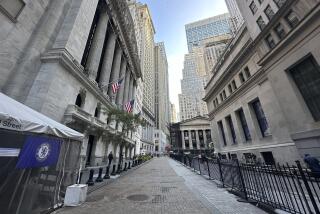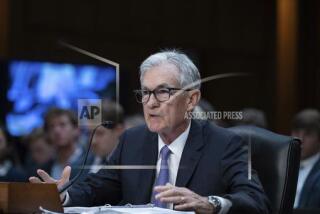Greenspan Now Says Recession Is Almost Over
- Share via
WASHINGTON — Federal Reserve Board Chairman Alan Greenspan on Wednesday returned to a more upbeat assessment of the economy after a brief spell of pessimism, predicting that the recession will end soon and that inflation will remain in check.
In wide-ranging testimony before the Senate Banking, Housing and Urban Affairs Committee on the state of the nation’s economy, Greenspan refused to say whether the Fed believes that it must lower interest rates further to spark a quick recovery. However, he indicated that Fed policy-makers are concerned about inflation and suggested that they may follow a go-slow approach about further rate cuts.
“What we are endeavoring to do is stabilize the economy first and then provide a way to come out of the recession in a non-inflationary track,” Greenspan said.
Still, Greenspan said he believes that the Fed’s previous moves to cut rates are starting to have an effect, prompting a slight upswing in the nation’s money supply and easier lending practices by major banks. As if to underscore that point, Bank of America on Wednesday cut its prime lending rate for its best corporate customers by 0.25% to 8.75%.
With oil prices and interest rates falling, Greenspan added that the economy is in a much better position than even a month ago to pull out of the slump, especially if the Persian Gulf War ends quickly. In a semiannual report to Congress on the economy, Greenspan stated that the Fed generally agrees with the Bush Administration’s economic forecast for 1991, which calls for a gradual recovery to begin in the middle of the year.
Greenspan said “the balance of forces does appear to suggest that this downturn could well prove shorter and shallower than most prior postwar recessions.”
The Fed chairman’s comments marked a return to the optimism he expressed about the economy just before the war began in mid-January and seemed to signal a reversal of his more recent pessimistic statements, in which he had indicated growing concern about the credit crunch hitting the nation’s banking system.
After the war began, Greenspan moved aggressively to slash interest rates and testified before Congress that he was concerned by the sluggish growth in the nation’s money supply and a worsening contraction in credit conditions in many regions of the country.
Greenspan said he has become more optimistic in recent days, primarily because of the plunge in oil prices and interest rates.
“An important reason for this (optimistic) assessment is that one of the most negative economic impacts of the Gulf War--the run-up in oil prices--has been reversed,” Greenspan said. “Another is that the substantial decline in interest rates over the past year and a half, especially in the past several months, should ameliorate the effects of the crisis in the Gulf and of tighter credit availability. . . . The growth in the money supply is beginning to accelerate.”
He also denied recent assertions by private economists that, because of the weakened state of the banking industry, the Fed’s policy moves to cut rates have failed to have any real impact on the credit crunch or the overall economy.
“We do have the flexibility to move,” he stressed. “And we will continue to move against the credit crunch until it is resolved. We are lowering interest rates in order to lower the cost of funds to banks and get them to open up their lending again to credit-worthy borrowers.”
Greenspan noted that the Fed and the Bush Administration will jointly announce within the next few days an easing of the regulatory guidelines followed by federal bank examiners, as part of a campaign to soften the effects of the credit crunch.
The policy change comes in response to mounting complaints from bankers and corporations across the nation who have argued that overzealous bank examiners, reacting to the speculative excesses of the 1980s, have made it increasingly difficult for bankers to make loans, even to credit-worthy customers.
“It has been human nature for examiners to pull back in the way that they have,” to the earlier lending excesses by banks and savings and loans, Greenspan said. He added that the new guidelines would be designed, however, to “get regulators to make sure they are not overreacting.”
“There needs to be a balance” between the easy policies of the mid-1980s and overly stringent standards, he said.
Greenspan suggested that the new regulatory guidelines will effectively end the recent practice by some examiners of forcing bankers to value their loan portfolios only at the current market prices of the properties held against those loans. With real estate prices declining, that practice of “marking loans to market” has forced banks to curtail new lending to shore up their balance sheets.
Separately, Greenspan said he still supports a controversial Bush Administration proposal to cut the capital gains tax rate--a move successfully defeated by congressional Democrats several times in recent years.
PRIME RATE CUT
B ofA reduced its prime lending rate a quarter-point to 8.75%. D2
More to Read
Get the L.A. Times Politics newsletter
Deeply reported insights into legislation, politics and policy from Sacramento, Washington and beyond. In your inbox twice per week.
You may occasionally receive promotional content from the Los Angeles Times.










